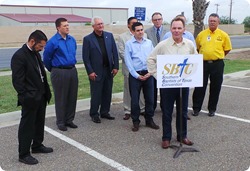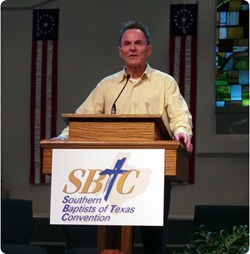The Real Story of the Southern Baptist Convention Engages All Generations
I will never forget what a man told me weeks before our most recent annual meeting in Baltimore. He said, “The most troubling thing about our convention at this time is that in our very diverse denomination, many want the Southern Baptist Convention to become like their subculture.” His words were insightful and a great warning for each of us.
The Southern Baptist Convention is comprised of 15.7 million people who represent over 50,000 churches and mission congregations. Some of our churches are in rural settings, while other churches are in metropolitan areas. Some of our pastors are serving their respective churches full-time while others also hold an additional job in the secular world. Theologian Timothy George stated in an article he released on June 2, 2014, entitled Troubled Waters that, “Southern Baptists have become one of the most ethnically diverse and multilingual denominations in the country.”
Therefore, we must hold high the real story of the Southern Baptist Convention that engages the diversity of all generations. I believe our real story as Southern Baptists is appealing cross-generationally. What is this story? We are a people that are:
1. Reaching the world for Christ.
Everything we do is about reaching the world for Christ. Just as any person, leader, or church experiences mission drift at times, our convention has also had moments of this. Yet, again and again, we always return to the very core of who we are and why we do what we do – and that is to reach the world for Jesus Christ.
2. Theologically balanced and committed to biblical integrity.
Our Baptist Faith and Message 2000 is our confessional statement as a convention of churches. When this was presented to our convention, in his letter to Southern Baptists, the late Dr. Adrian Rogers, who was chairman at the time, wrote:
We have sought to retain all the strengths of that noble heritage to clarify the truths there expressed, and to address the needs of our own times.
Clarity about what we believe about Scripture and the doctrines of Scripture are absolutely imperative. I am so grateful our convention is solidly committed to the inerrancy and infallibility of Holy Scripture and committed to biblical integrity. At times, we may be pulled from side to side, but we always stand on the strengths of our theological past while addressing the needs of our own times. This helps us to be theologically balanced in this unbalanced world in which we live.
3. Advancing the gospel to the unreached peoples of the world.
Standing upon the shoulders of our theological and missional history, we are launching aggressively to unreached peoples internationally. The Great Commission is not something we simply talk about, it is something we do. Can we do more? Absolutely, and we are committed to do more by planting churches, evangelizing all peoples, and making disciples. As we work together to push back the lostness of our world, we must always keep in our vision the need to be intentional in reaching the unreached peoples internationally. This is why we have 10,000 plus full-time missionaries around the world.
4. Strategically planting gospel churches nationally.
As we identify unreached peoples in our major cities and underserved, unreached areas in our nation, we are strategizing to plant gospel churches in North America. As we move toward a goal of planting 15,000 new gospel churches in North America over the next decade, we know we must equally do all we can to revitalize the churches we have established already. Our passion is to evangelize all people and plant gospel churches in North America.
5. Preparing the next generation of spiritual leaders.
Through our six Southern Baptist seminaries, we are equipping over 16,000 next generation spiritual leaders. These leaders will one day lead our churches, serve on our mission fields, and teach in our academic institutions. What God has done and is doing through our seminaries is a major part of our grand story as Southern Baptists.
6. Engaging the culture with the gospel of Jesus Christ.
We have seen since our meeting in Baltimore how Southern Baptists are engaging the culture with the gospel of Jesus Christ. We are there, speaking to issues in the public square for the protection of religious liberty and human flourishing. From the recent decisions from the Supreme Court to the crisis on the border of Texas, I have seen first-hand that Southern Baptists are engaging the culture with the powerful gospel of Jesus Christ.
7. Extending compassion through our disaster relief ministries.
One of the greatest parts of the grand narrative of Southern Baptists is our commitment to be on-site when people walk through disaster. You will find us present after hurricanes, tornadoes, floods, or any time people are in great need. Southern Baptists are a very compassionate people, and anywhere disaster hits, we are on the ground within hours, loving, caring, protecting, and providing for people. Whether it be crisis or disaster, we are always faithful to share the gospel of Jesus Christ.
This is our story that engages all generations
The grand narrative of our Southern Baptist story is so powerful when we are able to keep each of these things before us. This is who we are. This is what we are doing. When we tell our real story, all generations are excited by it and are willing to support it.
Therefore, do not forget, we are a people that are:
- Reaching the world for Jesus Christ
- Theologically balanced and committed to biblical integrity
- Advancing the gospel to the unreached peoples of the world
- Strategically planting gospel churches nationally
- Preparing the next generation of spiritual leaders
- Engaging the culture with the gospel of Jesus Christ
- Extending compassion through our disaster relief ministries
I promise you, share this real story about who we are, and we will become effective in appealing to all generations.
Yours for the Great Commission,
Ronnie W. Floyd
************
Dr. Ronnie Floyd is currently serving as the President of the Southern Baptist Convention. The Southern Baptist Convention is America’s largest Protestant denomination with more than 15.7 million members in over 46,000 churches nationwide.
To request an interview with Dr. Ronnie Floyd
contact Gayla Oldham at (479) 751-4523 or email gaylao@crosschurch.com.
Visit our website at http://ronniefloyd.com
Follow Dr. Floyd on Twitter and Instagram @ronniefloyd
The Border Crisis in Texas Personalized
The news stories and pictures of the border crisis in Texas all became personalized for me on Tuesday. The children and young people we saw are real children and real young people. We saw children from seven to seventeen years of age, from the countries of Honduras, Ecuador, El Salvador, Guatemala, and Mexico.
 On Friday, July 11, I issued a Call to Prayer: Responding to the Crisis on the Texas Border, and addressed the border crisis as President of the Southern Baptist Convention. When I was called upon to accompany Dr. Russell Moore, President of the Ethics and Religious Liberty Commission, and Dr. Jim Richards, Executive Director of the Southern Baptists of Texas to the border of Texas, I cleared my calendar and joined them. Dr. Moore and I were together in McAllen, and Dr. Richards joined us in San Antonio. We were accompanied and escorted into these places by Mr. Ali Noorani, the Executive Director of the National Immigration Forum.
On Friday, July 11, I issued a Call to Prayer: Responding to the Crisis on the Texas Border, and addressed the border crisis as President of the Southern Baptist Convention. When I was called upon to accompany Dr. Russell Moore, President of the Ethics and Religious Liberty Commission, and Dr. Jim Richards, Executive Director of the Southern Baptists of Texas to the border of Texas, I cleared my calendar and joined them. Dr. Moore and I were together in McAllen, and Dr. Richards joined us in San Antonio. We were accompanied and escorted into these places by Mr. Ali Noorani, the Executive Director of the National Immigration Forum.
What Did We Do?
We began yesterday morning by touring a Texas Border Patrol facility in McAllen, Texas. Within twenty hours of entering our country, children are brought to facilities like this and cared for until they are taken elsewhere, depending on their situation and physical condition. This facility has just been renovated and can facilitate the care of approximately 1,000 children. Following this forty-five minute tour, we held a press conference that was very well attended by the media.
 Then, we drove 270 miles to San Antonio, Texas. Upon arrival at Lackland Air Force Base, we toured the Health and Human Services Facility for migrant children, ages twelve through seventeen. This facility houses up to 1,200 young people. They are usually at this center less than one month before being assigned to their next location. Following this forty-five minute tour, we held another press conference for the media in San Antonio, as well as other media outlets that called into the conference.
Then, we drove 270 miles to San Antonio, Texas. Upon arrival at Lackland Air Force Base, we toured the Health and Human Services Facility for migrant children, ages twelve through seventeen. This facility houses up to 1,200 young people. They are usually at this center less than one month before being assigned to their next location. Following this forty-five minute tour, we held another press conference for the media in San Antonio, as well as other media outlets that called into the conference.
Due to flight schedules, we quickly headed to the San Antonio International Airport, and began to make our way home. Before boarding for my flight to Dallas, I was interviewed by no less than five media outlets from around the country. The attention the media is giving to this crisis tells us one thing: It is a major crisis in our nation.
What Did We See and Hear?
As I said earlier, the children we saw in McAllen were as young as seven years of age, and in San Antonio, the young people we saw were twelve to seventeen years of age. We have six grandchildren, of which the oldest is eight years of age. When I saw these little boys and girls, I thought of my granddaughter, Reese Caroline, who just turned seven. When I heard a seven year-old boy asked a question about his family and he stated, “I have no family”, my heart melted.
My mind immediately went to our Reese Caroline, who was the same age as this seven year-old boy, and our Parker, who will be seven years old in August, and I thought: I cannot imagine how a seven year-old child could leave his country in Honduras, Guatemala, Ecuador, El Salvador, or Mexico and make the trek here safely, ending up in McAllen, Texas. There is no way I can even think of our Peyton, Reese, Parker, Beckham, Jack, or Nora making the trek across a dangerous terrain, entering into a different country than their own. But friends, it is happening every day in this world.
Why are they doing this? Through translators, these children from age seven to seventeen told us why:
- A better life
- Fear of gangs
- Violence
- Human Trafficking
- Poverty
When conditions are bad enough, people will do anything. I stated in our San Antonio Press Conference: “People will go a long way and tackle obstacles when they feel that hope is possible. They are hoping for a better life.” Hope will drive even a child to pursue a better future. This is why gospel churches need to step up to this moment and present the powerful hope of the gospel of Jesus Christ.
What Do We Need to Do Now?
Yes, the border crisis is personalized. Now, I reflect upon the faces of these children and young people. Christ-followers, what do we do now?
1. Pray for the leaders of our nation diligently. We need to humbly call upon the leaders of our country to fix the immigration system in our nation. Since we have elected them to lead us, we need to pray for them to come together and agree upon what needs to be done in reforming our immigration system. I want to request that you lead your church to do the following: Next Sunday, ask your church to pray with you about this major crisis in our nation. We have done this for the past two Sundays in our fellowship.
2. Pastors, especially the pastors who lead churches located on the borders of our nation, lead your church to do whatever you can to demonstrate compassion to all immigrants, meeting their needs, and proclaiming the hope we have in Jesus Christ. The great news is that God is moving and changing the lives of many of these children and young people, as they are coming to know Jesus Christ personally. God is committed to bringing people unto Himself, so let’s get involved with what He is doing.
3. Prepare to engage in helping others through this crisis. I stated in our press conferences yesterday that our Southern Baptist churches are ready to help all persons in need if we are given the opportunity to do so. Many of our churches that are located on the border of Texas are doing as much as they are permitted to do to help right now; thanks to each of these pastors and churches as well as our Southern Baptist National Disaster Relief Ministry that was very involved in this crisis until they were no longer permitted. We pray for the open door in the future for all of us to be able to help.
For me, the border crisis is now personalized. I hope that after reading this and praying about it, it will become personalized for you.
Yours for the Great Commission,
Ronnie W. Floyd



